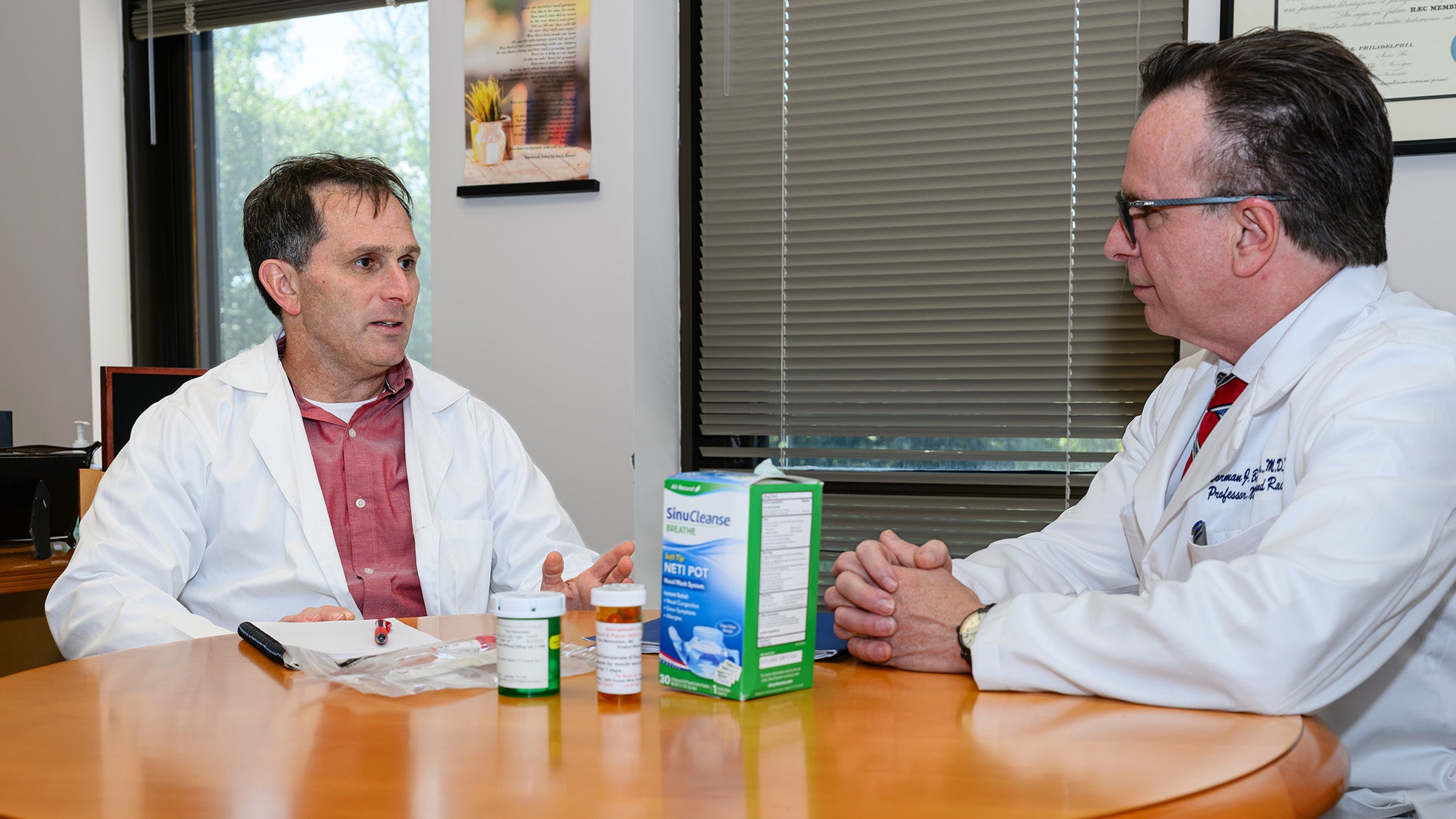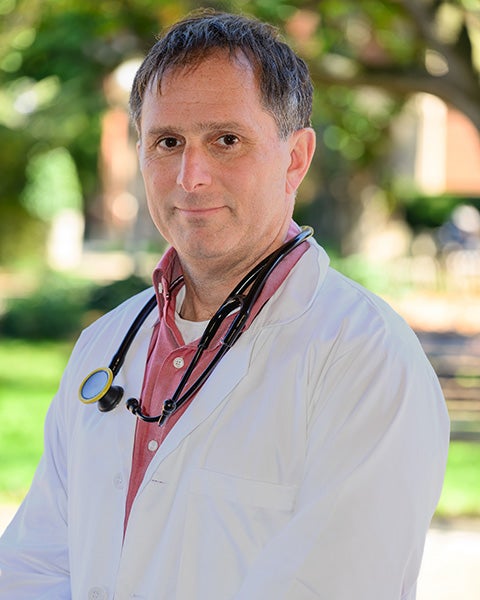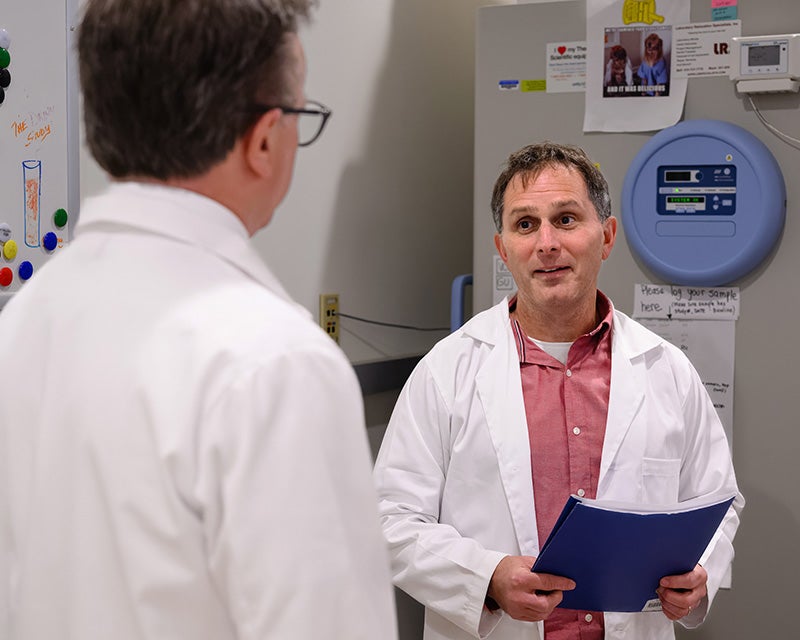Dedication to Primary Care Research Earns Merenstein Prestigious Honor

Posted in News Stories | Tagged antibiotic resistance, faculty honors, medical education, National Academy of Medicine, primary care, probiotic research, research
(October 21, 2024) — More than half of all patients are treated in a primary care setting, visiting their local clinic or family medicine doctor for ailments like an upset stomach or a troublesome cough. And yet less than 0.5% of research dollars from the National Institutes of Health go to fund primary care studies to help doctors and other clinicians make better decisions in how to care for their patients.

Dan Merenstein, MD, is working to close that gap. In recognition of his dedication to primary care research, Merenstein was elected to the National Academy of Medicine (NAM) in 2024. Fewer than 100 academics are admitted to the academy each year, with new members selected by their peers in recognition of outstanding professional achievement and commitment to service.
As a tenured professor and director of research programs in the department of family medicine at Georgetown University School of Medicine, Merenstein has published hundreds of research papers, many focused on the appropriate use of antibiotics and probiotics, as well as a long-running HIV cohort study. He is also a professor of human science in the School of Health, where he teaches undergraduate students and strives to help educate future clinicians on understanding how to critically evaluate scientific evidence.
“Primary care research can impact almost everyone, but it’s understudied and underfunded,” he says. “I think if I can provide even a little bit of evidence that can help doctors and clinicians find better interventions, that is very rewarding to me.”
Building Evidence for Probiotics
Merenstein’s focus on antibiotic and probiotic use grew directly from his experiences in the clinic.
“With probiotics, people were saying, ‘I’m giving this to my kids,’ or ‘Should we take yogurt with that antibiotic?’” he recalls. “I didn’t think there was enough evidence to answer those questions, so I decided to research them myself.”
Merenstein was an early leader in research that documented how probiotics benefit human health, particularly in respiratory and gastrointestinal infections, and that helped define the indicators for probiotic use. His group has conducted more than 10 clinical probiotic trials, enrolling well over 2,000 participants.
The Fight Against Antibiotic Overuse
Merenstein’s latest project will build on his previous research to shed new light on antibiotic overuse.
“When I started practicing medicine, we were giving out antibiotics like they were vitamin C,” he says. “I think that has changed somewhat, but we have a long way to go.”
In a large new study to launch in January 2025, researchers at Georgetown and six other sites across the country will study patients with sinusitis, a common upper respiratory infection, to determine which treatments are most effective. A major goal is to determine which patients truly need antibiotics, and which can benefit from interventions like nasal rinse treatments, nasal steroids or over-the-counter treatments.
“We know that most sinusitis is caused by viruses, and yet we give antibiotics 80% of the time,” he says. “It’s the number one reason people use antibiotics in the United States in an outpatient setting.”
Reducing unnecessary antibiotic use can help patients avoid uncomfortable side effects and is also a crucial step to slowing the spread of antibiotic-resistant microbes, he notes.
Merenstein is co-principal investigator for the new study, which received $23.6 million in research funding from the Patient-Centered Outcomes Research Institute (PCORI). Researchers plan to enroll 3,700 patients in the study.
“It really comes down to asking: ‘When I’m in the clinic with a patient, how can I treat this patient better?’” he says. “Hopefully, my research is helping to answer that question.”
HIV Study Guides Research Approach
Merenstein also has a deep passion for his long-standing HIV research that focuses on people living with HIV to better understand the disease’s health impacts as they age.
He is co-principal investigator of a long-running cohort study, which follows men and women living with HIV alongside healthy volunteers — “controls” for the many studies underway. Since 1984, more than 12,000 people have participated in these cohorts. It has led to important findings, including a 2021 study that suggested women with HIV had higher rates of non-AIDS comorbidities like cardiovascular, kidney, liver and bone disease.
“Longitudinal cohort studies like the one I have been fortunate to be a part of allow us to follow people over time and learn about things we could never witness in a short-term randomized controlled trial,” says Merenstein.
A Recognition for Primary Care Research

Merenstein says his selection for the National Academy of Medicine moved him more than he expected it to.
“To some, the impact of my research might not be readily apparent — like it is with cancer research, for example,” Merenstein says. “I’m studying common problems seen in primary care settings, like diarrhea and antibiotic use, but the outcomes of this research can have a significant impact.”
Merenstein points to the effects of his research on people’s ability to work.
“Because so much care occurs in the outpatient primary care settings, these types of studies have a significant impact on public health,” Merenstein says. “Even simple things like sinusitis can result in unnecessary expenses and time off of work. I’m so grateful that the NAM recognized the importance of this work.”
Merenstein is quick to share the credit with his colleagues inside and outside Georgetown and student research assistants, noting that research is a “team sport.”
Next, he hopes to do more research in the area of food and nutrition; he has applied for a grant to study the potential benefits of kombucha, a tea fermented with bacteria and yeasts.
“We’d like more evidence to answer some of these questions and advise patients,” he said. “Does kombucha actually lower blood sugar — our pilot study seemed to show that. There are hundreds of other basic food-related questions that we need answered so that we can improve care. Food as medicine is often talked about, but not truly studied enough.”
Preparing the Next Generation
Along with his other work, Merenstein finds it rewarding to help train future clinicians. But rather than working with medical students, as a professor in the School of Health, he primarily teaches undergraduates.
“I love teaching,” he says. “Undergraduate students are open to thinking broadly about health and well-being, and have time to consider pursuing research questions as a part of their studies.”
Merenstein regularly involves undergrads in his research, giving them opportunities to experience clinical research and publishing.
“They go to the clinics, collect data, enroll patients, conduct tests, help write papers — they do a lot,” he said. “It’s a symbiotic relationship.”
Supportive Environment
Merenstein says Georgetown, and its MedStar Health partnership, has provided a supportive environment for research.
“Many of our studies would never have been funded or completed without our great partners at Medstar Health Research Institute,” Merenstein says. ”Also, having the medical center on the same campus as our undergraduate schools is relatively unique, and has allowed me to work with many individuals to accomplish our goals. The freedom Georgetown has given me to explore many different avenues has been a perfect fit for my research interests.”
Merenstein joins several Georgetown faculty in the National Academy of Medicine, including Lucile Adams-Campbell, Mark Dybul, Anthony Fauci, Judith Feder, Jesse Goodman, Lawrence Gostin, Patricia King and Robert Groves.
Ilima Loomis
GUMC Communications
Photos by Phil Humnicky/Georgetown Univ.
